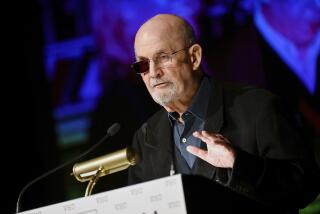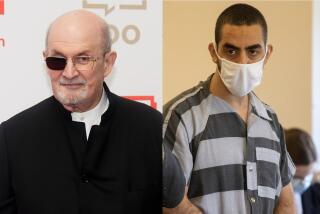A Look at the Mystery of India’s Independence : Rushdie’s ‘Riddle’ Unfolds in Documentary
- Share via
It is cruel but fair to say that Salman Rushdie’s career owes much to the late Ayatollah Ruhollah Khomeini.
It was not “The Satanic Verses” but the death sentence imposed by Khomeini that boosted Rushdie’s book sales, made the author a living martyr for free expression and--because he was forced into hiding, where he remains--made him a mystery man as well.
And when, on Sunday, cable’s Discovery Channel presents “The Riddle of Midnight,” a 90-minute documentary on India based on Rushdie’s 1980 novel, “Midnight’s Children,” there is no doubt that many people will be tuning in to get a glimpse of Rushdie. The now-secluded author narrates and appears throughout.
“The Riddle of Midnight” is dense and often difficult to follow. It was made in 1987 for Britain’s Channel Four. Viewers there, well-versed in British colonial history, undoubtedly had more background to draw on.
The film does provide some insights into Rushdie and his place in the Muslim world.
Born in India, Rushdie is the product of an affluent, urban Muslim family.
“I come from the Indian bourgeoisie, one of the most confident, successful, doubt-free groups of wealth-creators on the planet,” Rushdie explains in the film. “But I have my doubts these days about that doubtlessness. Does wealth really trickle down, let’s say, from high rise to hovel?”
After spending most of his adult life in England, however, Rushdie is seen returning in the 40th year of India’s independence (and his birth). He finds “a throng not only of people but also of dreams, memories, fears, hopes, portends, fictions and Gods.” This is Rushdie’s personal rediscovery of his native India, a country of enormous political, cultural and religious complexity as well as ironies.
Rushdie’s original work, “Midnight’s Children,” was fiction, populated by the children born in the hour of India’s independence. “The Riddle of Midnight” finds the real-life counterparts to those characters--a Parsee businessman, a Bombay “pavement dweller,” a Hindu demagogue, farmers and, in the film’s most moving moment, a Sikh woman whose family was murdered by government-sponsored terrorists.
Divided into three sections, “The City,” “The Country” and “The Gods,” “The Riddle of Midnight” refers to the puzzle of Indian independence, which was born at midnight on Aug. 14 and 15 in 1947.
On that day, Indian Prime Minister Jawaharlal Nehru, the Hindu leader of India’s movement for independence, said: “At the strike of the midnight hour, when the world sleeps, India will awake to life and freedom. A moment comes, which comes but rarely in history, when we step out from the old to the new, when an age ends and when the soul of a nation finds utterance.”
What Rushdie finds on his return, however, is a cacophony of social discord, confusion and danger.
In “The City” he finds “the systematic creation of a militant Hindu fundamentalist consciousness. That’s something new in India.” He finds bourgeois businessmen losing sight of their heritage as they continue to embrace Western styles and cultures. He finds families of pavement dwellers who live “in the uncaring shadow” of the skyscrapers their cheap labor has built but who, to the government of Bombay, are statistical “mirages” and, therefore, do not exist.
In “The Country” Rushdie finds Marxism taking root. One woman, who has the local party to thank for her increase in wages, explains her stomach-first politics in plain and simple terms. “This is the only party that has benefited me. So how can I support any other party?”
The riddle, Rushdie finally explains, is, “How can a nation that never previously existed become independent? What does it mean to call this crowd of separate, national histories, conflicting cultures and warring faiths a nation? Maybe it’s just something we made up. A story. A dream. Then again, maybe such fictions can become facts.”
The reality of India and the price of independence, though, has been a harsh one for many of its people, who live marginal, hand-to-mouth lives.
“I don’t know what is going to happen to India,” one man concludes.
“Here is the heart of the riddle,” Rushdie says: “What is a real Indian, and conversely, what is another one?” Answering his own question, he decides, “Born of India, born of Indian parents, it’s the lack of definition that unites you.”
More to Read
Only good movies
Get the Indie Focus newsletter, Mark Olsen's weekly guide to the world of cinema.
You may occasionally receive promotional content from the Los Angeles Times.










